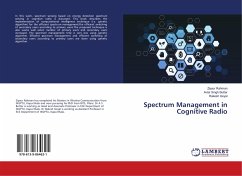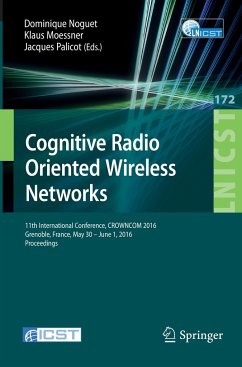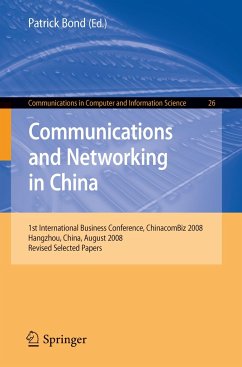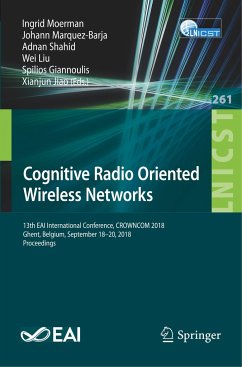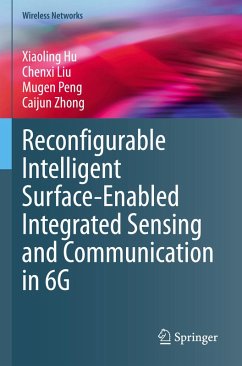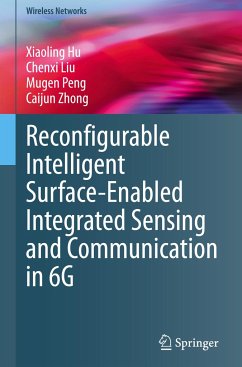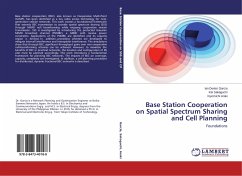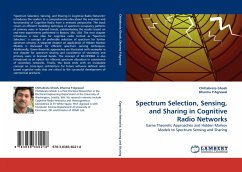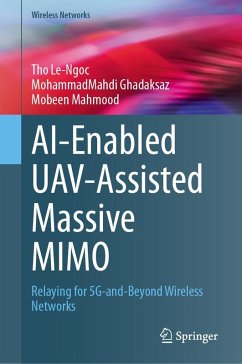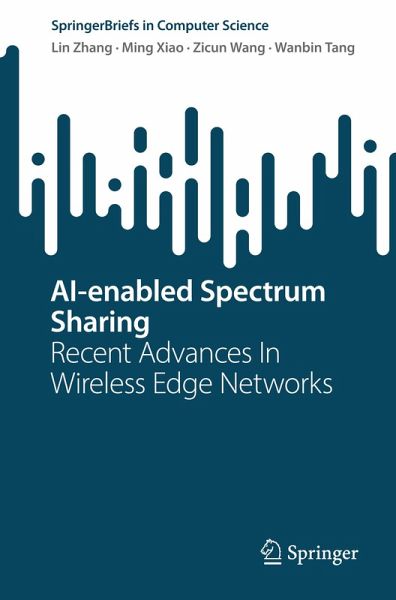
AI-enabled Spectrum Sharing
Recent Advances In Wireless Edge Networks

PAYBACK Punkte
19 °P sammeln!
Wireless edge networks aim to provide last-mile wireless connections between access points and diversified wireless end devices. Recent years witness the rapid development of wireless communication ecosystems including fundamental theory breakthroughs, manufacture capability improvements, as well as the explosively increasing wireless end devices and service demands.It is known that spectrum is the irreplaceable resource for wireless transmissions in edge networks. Nevertheless, it is quite challenging and inefficient to allocate dedicated spectrum for each single transmission link due to the ...
Wireless edge networks aim to provide last-mile wireless connections between access points and diversified wireless end devices. Recent years witness the rapid development of wireless communication ecosystems including fundamental theory breakthroughs, manufacture capability improvements, as well as the explosively increasing wireless end devices and service demands.
It is known that spectrum is the irreplaceable resource for wireless transmissions in edge networks. Nevertheless, it is quite challenging and inefficient to allocate dedicated spectrum for each single transmission link due to the severe shortage of spectrum resource. Alternatively, by enabling different links to use the same spectrum, spectrum sharing is envisioned to be a promising paradigm to properly accommodate the conflict between the scarce spectrum resource and substantial spectrum demands. Conventionally, model-driven optimization methods are widely adopted to optimize the spectrum sharing policy in the edge network and achieve friendly coexistence among different transmission links. However, future wireless edge network is predicted to be large-scale and heterogeneous, model-driven optimization methods will be problematic such as imperfect modelling and unacceptable overheads.
Different from the existing related books on spectrum sharing or spectrum management for wireless edge networks, our book leverages the artificial intelligence (AI) to achieve smart spectrum sharing for wireless edge networks and elaborates AI-enabled spectrum sharing technique in typical scenarios, which can guide the development of next-generation spectrum sharing standards, as well as provide innovative spectrum sharing methods for related practitioners, including research fellow, lecturers, and students.
It is known that spectrum is the irreplaceable resource for wireless transmissions in edge networks. Nevertheless, it is quite challenging and inefficient to allocate dedicated spectrum for each single transmission link due to the severe shortage of spectrum resource. Alternatively, by enabling different links to use the same spectrum, spectrum sharing is envisioned to be a promising paradigm to properly accommodate the conflict between the scarce spectrum resource and substantial spectrum demands. Conventionally, model-driven optimization methods are widely adopted to optimize the spectrum sharing policy in the edge network and achieve friendly coexistence among different transmission links. However, future wireless edge network is predicted to be large-scale and heterogeneous, model-driven optimization methods will be problematic such as imperfect modelling and unacceptable overheads.
Different from the existing related books on spectrum sharing or spectrum management for wireless edge networks, our book leverages the artificial intelligence (AI) to achieve smart spectrum sharing for wireless edge networks and elaborates AI-enabled spectrum sharing technique in typical scenarios, which can guide the development of next-generation spectrum sharing standards, as well as provide innovative spectrum sharing methods for related practitioners, including research fellow, lecturers, and students.






